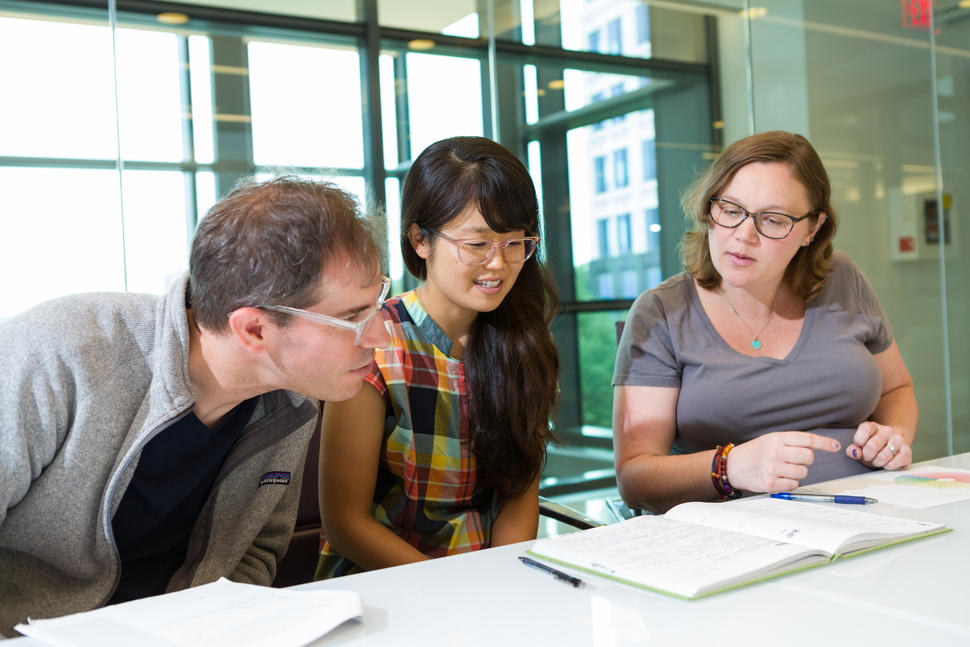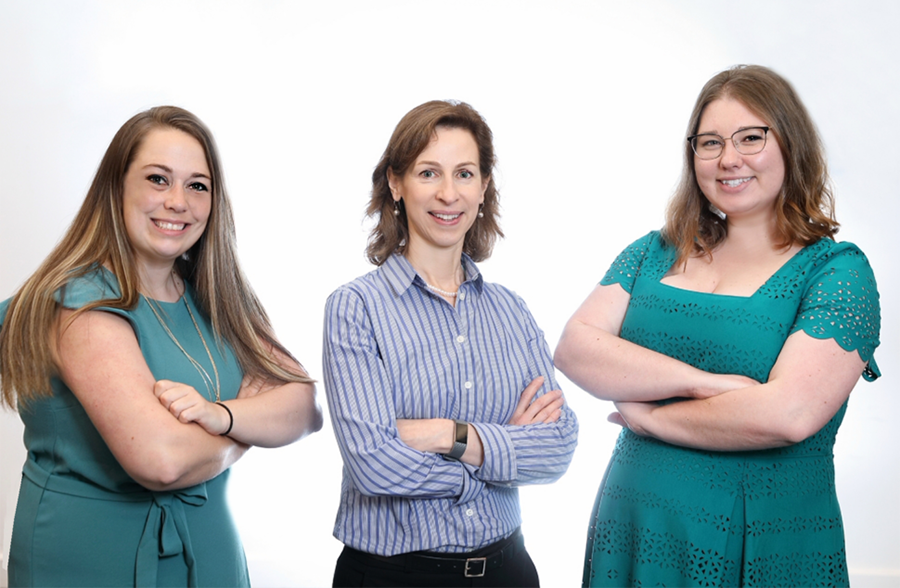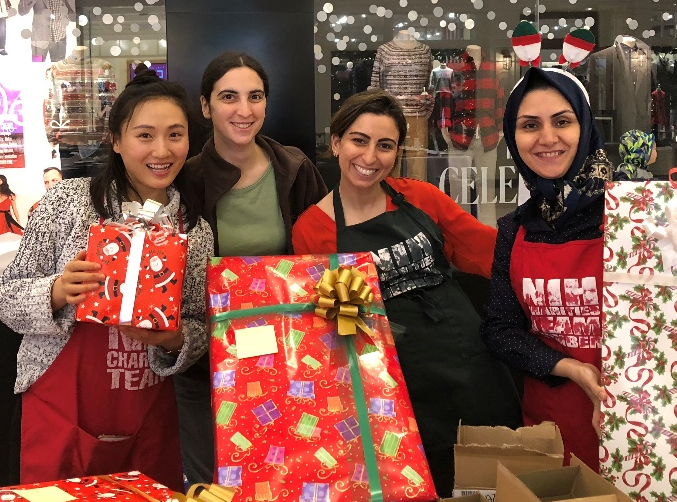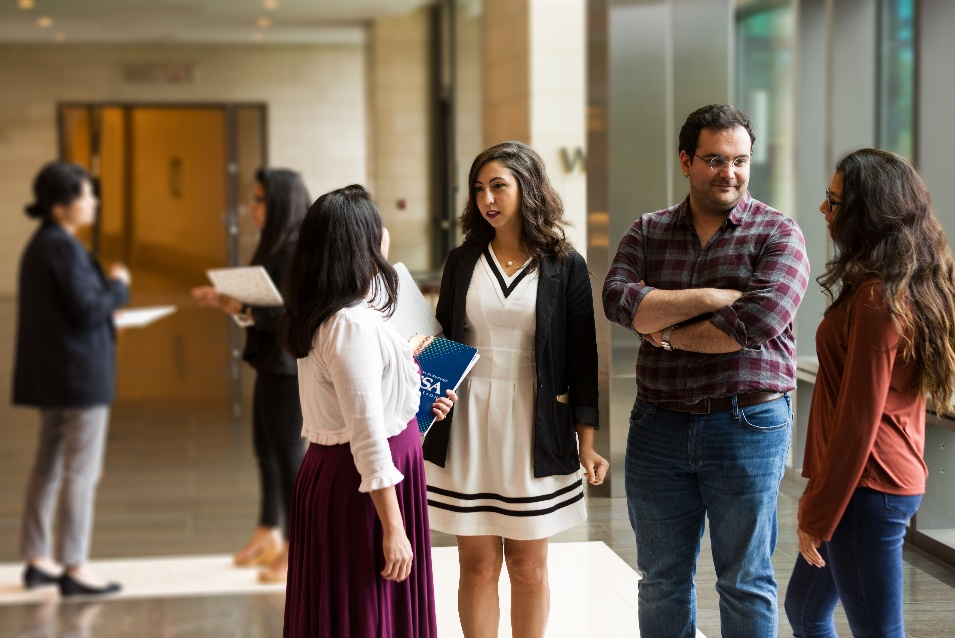The Training Experience at DCEG
, by Justine E. Yu, Ph.D.
Selecting a research training program can be a difficult decision for many fellows at various stages in their careers, often requiring a balance between personal and professional preferences, comprising factors such as mentor, research topic, institutional resources, and individual goals.
Training Program At a Glance
The Division of Cancer Epidemiology and Genetics (DCEG) of the NCI prides itself as an optimal training environment for those interested in conducting research in cancer epidemiology. For the past 25 years, the Division has maintained a long-standing commitment to the recruitment, retention, and development of a diverse group of investigators and trainees.
DCEG offers a competitive stipend and wide variety of scientific training opportunities for individuals at different career stages ranging from postdoctoral, predoctoral, and postbaccalaureate fellows.
- Postdoctoral fellows have their doctoral degree and may conduct their research training for up to five years. The average length of stay for postdoctoral fellows is three and a half years before proceeding to a permanent position or promotion to research fellow.
- Predoctoral fellows complete research for six months or more towards their dissertation at DCEG through the NIH Graduate Partnership Program, hosted by the NIH Office of Intramural Training and Education. Participants enjoy the academic environment of a university, the extensive research resources of the NIH, and the breadth and depth of the research programs of both the host university and the NIH Intramural Research Program.
- Postbaccalaureate fellows typically join through the NIH Postbaccalaureate Cancer Research Training Award Program (open to U.S. citizens and green card holders), which provides students who recently completed a bachelor or master degree the opportunity to conduct full-time research prior to applying to a graduate or professional school. Post-bac fellows typically spend one to two years at DCEG.
Fellowship applications are accepted on a rolling basis. DCEG welcomes fellows from across the U.S. and the world. The current fellow population is comprised of 139 fellows: 59% postdoctoral, 15% predoctoral, 26% postbaccalaureate with 66% from the U.S. and 34% from abroad.
The DCEG Fellowship Program prepares fellows for a wide range of careers in epidemiology, genomics, biostatistics, and bioinformatics. The majority of postbaccalaureate fellows continue on to graduate or medical school programs, and postdoctoral fellows find careers in a variety of sectors, such as academia, government, private industry, and non-profit organizations.
One of the main benefits of training in DCEG is working with the ‘best of the best’— DCEG investigators are pioneers in their field and there are abundant opportunities to collaborate with people across the U.S. and throughout the world.
Countless Opportunities for Professional Development
In order to prepare fellows for successful careers, DCEG champions innovative opportunities to obtain integrated scientific and career training.
The Division is comprised of the world’s premier experts in cancer epidemiology who conduct population and multidisciplinary research to discover the genetic and environmental causes of cancer and the means to prevention. DCEG is uniquely positioned to conduct epidemiology research with access to the latest technology, methods, and data registries along with collaborative partnerships across the NCI, NIH, and global research community. Fellows get a well-rounded experience with these resources at their disposal and full involvement in the design, conduct, analysis, and publication of their research projects.
In addition, the Office of Education, led by Jackie Lavigne, Ph.D., M.P.H., oversees training and career development for all scientific staff at DCEG, and offers workshops to build skills in molecular epidemiology, science management, grant writing, scientific presentations, mentoring, and other professional communications and networking opportunities.
I’m grateful to the Office of Education, which provides multiple trainings that aid my professional development. For example, the grant writing course I attended in 2018 helped me to obtain the NCI Director’s Intramural Innovation Award the next year.
Fellow-Initiated Activities
Trainees are encouraged to participate in a variety of fellow-initiated activities which cover topics ranging from training and career development, advocacy and support groups, and volunteer and outreach opportunities.
The following list summarizes the fellow-initiated activities to date:
Training and Career Development
DCEG Fellow-Initiated Activities
-
Annual DCEG Fellows Training Symposium
DCEG fellows plan the Annual DCEG Fellows Training Symposium, which is a full-day, off-site event in the Spring, that includes invited keynote speakers, a fellows' poster event, career roundtables with alumni, and scientific presentations by fellows.
-
Career Development Seminar Series (CDSS)
The CDSS is a venue for NCI fellows from DCEG, the Division of Cancer Control and Population Sciences, and the Cancer Prevention Fellows Program to organize monthly seminars focused on career development topics for junior investigators in populations sciences. These topics include strengthening skills in grantsmanship, manuscript writing, and strategic career planning.
-
DCEG Fellows Editorial Board (DFEB)
DFEB is a group that offers fellows a free scientific document-reviewing service and the opportunity to build scientific editing and review skills of their own. The group provides confidential feedback on grammar, organization, and flow of scientific manuscripts, abstracts, proposals, posters and presentations.
-
DCEG Fellows Monthly Colloquia
The colloquia series offers fellows the opportunity to gather on a regular basis for scientific and social exchanges. The colloquia were conceived as a forum for fellows to discuss research and career topics in a relaxed, collegial atmosphere.
-
Postbaccalaureate Fellows Working Group on Writing Graduate School Statements
This working group is designed to function as a forum for postbaccalaureate fellows to plan next steps in their career through accountability, feedback, and support from their peers, under the guidance of Dr. Lavigne. The primary goal of the group is to help fellows develop a strong personal statement for application to graduate programs.
Trans-NIH Fellow-Initiated Activities
-
Annual NIH Career Symposium
The Annual NIH Career Symposium aims to highlight the diversity of career choices available to rising biomedical researchers. The Symposium typically consists of panels and workshops covering a spectrum of careers including academics, industry, government, patents/technology transfer, policy, and communications.
-
NIH Fellows Committee (FelCom)
NIH FelCom serves the NIH fellows community through the actions of eight subcommittees and fourteen committee liaisons. The eight subcommittees focus on particular aspects of the advanced training experience at NIH and include Career Development, Distinguished Clinical Teacher Award (DCTA), Fellows Award for Research Excellence (FARE), Job Fair, Mentoring, Publicity, Social, and Web page.
Advocacy and Support
The training program has evolved to meet the needs of fellows. Below are the groups established to provide support related to work-life balance, advocacy and community outreach. New groups are encouraged and are generated organically by each new cohort of trainees.
-
DCEG Fellows Committee (DFel)
The mission of DFel is to create a vibrant, supportive, and long-lasting fellows’ community by representing, preserving, and promoting the interests of all DCEG fellows.
-
DCEG Fellows Community Assistance, out-Reach and Engaged Services (Dfel CARES)
Dfel CARES connects fellows with service projects where they can work as a team and give back to the community. Projects have a public health emphasis.
-
Fellows’ Cancer Health Disparities Interest Group
This Fellows’ Cancer Health Disparities Interest Group was initiated to create a platform to discuss topics related to health disparities through a monthly seminar.
-
Inclusivity Minute
The Inclusivity Minute is an initiative to cultivate a culture of inclusion, spearheaded by the DCEG Fellows Committee and staff from the Office of the Director.
-
NCI Shady Grove LGBTQ+ Group
The NCI Shady Grove LGBTQ+ Group helps its members thrive in their professional and personal lives by addressing issues unique to the LGBTQ+ community.
The NIH gives fellows the ability to curate their own experience by encouraging our involvement in grassroots organizations. As the liaison to the training directors for the NIH Fellows Committee, I got to witness first-hand how much the NIH cares about creating a rich and successful experience for their fellows.
Awards and Grants
DCEG fellows have access to multiple funding opportunities, both internal and external, to support their research and advance their professional development. In addition to the opportunities provided by the NIH or other government agencies, such as the K99/R00 grant, and society travel awards, the following lists examples of awards available to DCEG fellows.
Research Awards
-
Intramural Research Award (IRA)
The purpose of the Intramural Research Award (IRA) is to encourage DCEG fellows to develop innovative and interdisciplinary collaborative research projects and support the mission of DCEG. Winners of an IRA are given up to $50,000 for one fiscal year.
-
NCI Director’s Intramural Innovation Award
The NCI Director’s Intramural Innovation Award Program is designed to support development of highly innovative approaches and technology aimed at significant cancer-related problems. The program offers career development awards targeted to postdoctoral fellows, staff scientists, and staff clinicians at all levels with an upper limit of $10,000.
Travel Awards
-
NIH Fellows’ Award for Research Excellence (FARE)
NIH FARE recognizes the outstanding scientific research performed by NIH intramural postdoctoral fellows and is sponsored by the NIH Fellows Committee, the Scientific Directors, and the NIH Office of Intramural Training & Education, and funded by the Scientific Directors. FARE award winners receive a $1500 stipend for travel to present their research at a scientific meeting.
-
DCEG Fellows’ Award for Research Excellence (DFARE)
DFARE recognizes outstanding scientific research conducted by DCEG fellows who have made exceptional contributions to a DCEG research study. Similar to FARE awards, DFARE award winners receive $1500 support for travel to present their research at a scientific meeting.
-
The Robert A. Welch Fellows Travel Award
The Robert A. Welch Fellows Travel Award named in honor of the late Robert A. Welch, the founding Director of Operations of the NCI-Frederick Cancer Genomics Research Laboratory, provides DCEG postdoctoral fellows up to $1,500 in financial support to travel to attend a scientific conference with a focus on genetic or genomic technology.
Other Awards
-
Fellowship Achievement Award
The Fellowship Achievement Award honors postdoctoral fellows who have excelled in their time at DCEG. Branch chiefs nominate fellows for this award at the time of the annual personnel review meetings with the Division director, and if selected, fellows receive a two-step stipend increase at their next appointment renewal date.
-
NIH Summer Mentor Award
The NIH Summer Mentor Award program provides current postdoctoral and clinical trainees funding for a summer intern to assist with their research studies.
Leadership Programs
In addition to the career development opportunities offered by DCEG, the NCI provides one-year leadership programs to help prepare postdoctoral fellows for successful independent research careers.
-
Diversity Career Development Program
The Diversity Career Development Program provides NCI postdoctoral trainees from underrepresented and disadvantaged groups with the tools necessary to develop as leaders in independent academic research careers. Fellows receive additional mentoring and networking opportunities and attend seminars and workshops designed to strengthen leadership, build confidence, and set a career vision and goals.
-
Sallie Rosen Kaplan Postdoctoral Fellowship
The Sallie Rosen Kaplan Postdoctoral Fellowship helps prepare female postdoctoral fellows at the NCI for the transition to independent biomedical research careers. Fellows receive additional mentoring and networking opportunities and attend seminars and workshops designed to strengthen leadership, time management, and self-promotional skills.
I can’t say enough about the excellent training and mentorship I’ve received at DCEG. My mentors and the Office of Education have been essential to my professional development with the countless trainings, seminars, and symposiums they offer. Everyone I’ve worked with is so supportive, knowledgeable and generous with their time.



